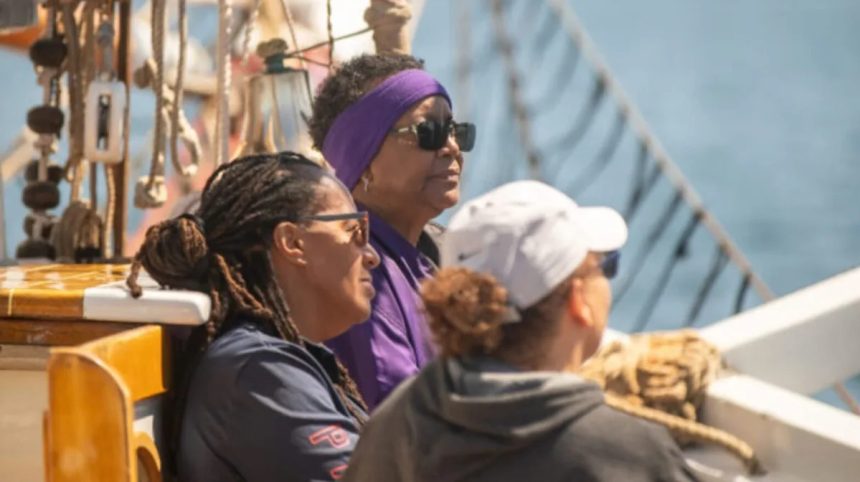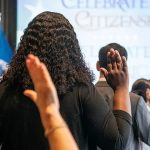When most people think of Maine, lobster and the outdoors come to mind. Take it a step further and consider the demographics, and Black people aren’t at the forefront. The state has been considered one of the “whitest” states in America.
While the majority of people living there are not people of color, there is no truth to the fact that there’s no Black life or culture. Lisa Jones, founder and CEO of Black Travel Maine, is changing the landscape. Through her company, she’s reminding locals and travelers of the deep-rooted Black history and culture, while also helping Black Mainers find community.
Putting a spotlight on Black life in Maine
Through Black Travel Maine, Jones curates cultural travel experiences tailored to each group, highlighting the state’s unique offerings. Jones fell in love with Maine at the height of the pandemic and quickly relocated before starting BTM.
Under her booking, there are walking tours, history lessons, weekend activities, culinary experiences, and more for people to explore Maine’s underrepresented communities. Black Travel Maine is specifically, but not exclusively, for Black and PoC travelers, and has attracted many demographics that often feel excluded, including the LGBTQ+ community. For those of the latter, Ogunquit is the state’s gayborhood. It’s also the town that houses the Admiral Inn, a charming, beach-friendly hotel with a warm Caribbean vibe, managed by Maine’s only Black female general manager, Carleen Anderson-Lalor.
Photo: Courtesy Photo Provided
Anderson-Lalor was born and raised in Jamaica and learned of opportunities in Maine through her sister, who’d begun working in the hospitality industry via the H-2B program. This government program allows international employees to work on a seasonal basis. Anderson-Lalor worked her way up from a housekeeper to her current position. She met Jones through her church, though she’d heard about her after Jones moved to the area.
While it was an initial culture shock, Anderson-Lalor has since adapted and made Maine her full-time home.
“We know that what attracts international workers to come to the United States to work is money. But specifically for Maine, I think it’s the people,” Anderson-Lalor gushed. “I think there’s still a lot of great people in Maine, who, despite being the majority, does not look at your color, but as MLK Jr. said, the content of your character. Maine is accepting. It’s a great place to live and to raise a family.”
Black Mainers say life in Maine is one of a kind
Ellen McKenzie is an eighth-generation Mainer. She considers herself a triple minority: Black, female, and a member of the LGBTQ+ community. She grew up in a family of eight children, and lives in Portland with her wife, Rachel Morales, who is from Boston.
Her family has an extensive history in the city, dating back to the era of the Underground Railroad. Throughout the city of Portland, 16 marks commemorate those who were passed through as part of the process of getting people through.
“My great-great-grandfather has two markers,” McKenzie said proudly.
And that’s not all.
“My grandfather, my mother’s father, if you go to the Maine Historical Society, which is on Congress Street, which is a main street in the city, they have a bunch of billboards, and one of the billboards is a gentleman and his wife, who was my grandfather and grandmother. In the photo, my grandmother is standing up because she was short, so she’s on a stool, and she’s holding a trophy,” she noted. “And the trophy is of my grandfather, who won the first Peaks to Portland swim race. If you take a ferry from Portland to Peaks Island, it’s a 20-minute ferry ride, and he swam it, and was the first one ever to win it.”

Photo: Courtesy Photo Provided
Growing up, McKenzie knew she was different, but she said life in Maine was great. As an avid traveler, Maine offers her a safer and more welcoming environment than most states. For her wife, the transition was initially challenging, despite spending summers in Maine with her family. But after meeting her wife while working at a university, she said finding camaraderie with like-minded people is what matters.
“Once I moved to Portland, that really changed. I really sought out opportunities to connect, and they were there,” Morales said. “There is a multicultural community, and the connections were easy, especially at the university. At the time, I was really missing Boston, and I was just missing that feeling, but I felt home pretty quick.”
Idella Glenn, who moved to Maine for a job from Virginia, shares similar sentiments with Morales.
“I came to Maine to work at the University of Southern Maine, and my role was vice president for equity inclusion and community impact,” she said, having lived and worked in Maine for five years before retiring and moving to North Carolina.
“Aside from the nice people in Maine, there’s a large immigrant population in the state that people aren’t aware of,” Glenn mentioned. “There’s a lot of services and programs and initiatives around welcoming immigrants to Maine,” which she says adds to the expansive and ever-growing diversity. Glenn found community first through her church before spearheading a social group where they held meetups.
Maine is renowned for its stunning coastal scenery, fresh seafood, and diverse array of outdoor activities. The latter is a main attraction for Black travelers looking to explore something new, while also learning to appreciate the concept of slowing down and taking time to enjoy the present moment.
As part of the Black Travel Maine experience, Jones invited several guests to partake in a sailing excursion aboard the historic Lewis R. French, one of the last remaining wind-powered schooners in Maine. Sailing may seem like a foreign privilege to Black people, but despite its limited popularity today, there’s a long history of Black sailing life in Maine. With Black life in Maine dating back to more than 400 years, Black people have played a vital role in shaping the state’s economy and history, with many working in trades such as shipbuilding, fishing, lobstering, and sailing.
Several attendees on the sailing excursion were first-time participants, excited about the rare opportunity to participate. One of those participants was Sylvester Anyuawu, aka Sly, from New Jersey. He initially learned about Black Travel Maine after booking a ski trip to Maine through its Facebook group the year prior.
“I had such a good time connecting with the group and was impressed by Lisa’s work. Everything was well-planned,” he told Blavity. “When I heard of the sailing trip, I jumped at it. I thought it would be interesting, and I do love the outdoors.”

Photo: Courtesy Photo Provided
The excursion included three nights on a traditional schooner sailing with full sails, two shared bathrooms, and stops at secluded islands, including a special lobster dinner onshore. Twenty people, outside of the staff, were aboard. Despite the different conditions, Anyuawu was happy with the outcome.
“Despite sharing a bathroom, it was calming being on the water and having the ability to unplug in a world where everything is so chaotic. It forced me to have conversations with people and think outside of the box for entertainment,” he asserted.
Kevin Stephenson Jr., a Philadelphia content creator who served in a dual role as a passenger aboard the Lewis R. French and the weekend photographer, was excited about the coastal offerings of Maine and for Black travelers to get into the outdoors and adventurous space.
“I don’t think a lot of the major cities have a coastal vibe like Maine does. When I think about D.C. or Baltimore, Atlanta or Miami, those cities really are coastal to the point where they have the same culture as Portland, Maine, but the vibes are different,” he shared.
Maine is committed to diversity in a time when DEI is nearly nonexistent
As the current political administration retreats from diversity and inclusion, Maine is fighting to maintain progress. There’s an annual Inclusion Maine conference, designed to help employers attract and retain a diverse workforce, which expands residency for said employees. Muhammad Humza Khan, who runs the conference, told Press Herald, “For us, this isn’t a political issue. We want Maine to be a place where anyone can live and work and feel welcome.”
Brian K. Oliver, a Baltimore-based content creator, joined the sailing excursion last year and couldn’t wait to do it again. This time around, he brought his business partner, Sephenson Jr., along for the ride. Having visited Maine a few times in the last year since first connecting with Jones on social media, and someone who is now a fan of the state, his most significant takeaway is always how inclusive the state is.
“I was surprised to learn about the diversity efforts in Maine because I think Maine is actually one of the very few states that I see taking that initiative and putting a lot of effort and money and time into getting more, not just Black people, but other people from different ethnic backgrounds to visit,” he stated.

Photo: Courtesy Photo Provided
Even in the workforce, there’s diversity. The captain and co-owner of the Lewis R. French is Becky Sigwright. Most captains are men, and she jokes that her husband is often confused as the captain, while she’s the cook. It’s a job she takes pride in, having always been attracted to sailing life. “I’m not the only female captain in Maine currently, but I’m the only female captain out of nine boats in our fleet with me being the only female,” she explained.
As for why women are less likely to enter a captain role, she said there are many fears related to gender roles.
“I think there’s a lot of historical prejudice against women sailors. For a long time, women were considered bad luck on boats, and I think some of that has stuck around,” she shared. “Also, it’s physically demanding work, which can be really intimidating to women; we often don’t see ourselves as strong, even though we totally are. The job is entirely doable, but it’s hard for everybody.”
She stated that over the past three years, she has observed a shift in her guest demographics.
“Our median guest is the recently retired white couple from Connecticut. But it’s fantastic to see more and more people. I think it’s very important that we make sure that people know that we are a safe place for people of color, people of other minorities too, and LGBTQ+ people and beyond. People who have joined have given rave reviews.”
Maine has a deep Black history and culture
During the Jim Crow era, Maine was a haven for Black tourists. Discrimination was still present, but compared to the South or the Midwest, the community was a bit more welcoming, and Black people were able to carve out spaces for themselves. It’s rumored that Maine’s first doctor may have been a Black man. The nation’s first Black lawyer passed the bar and began practicing in Portland.
Maine was also a key location for the Underground Railroad, with Portland as the overall hub and entry point for many freedom seekers arriving by ship. Just next door to the Admiral Inn sits the Hideaway Inn, one of Maine’s first Black-owned hotels. Nearby is the Ogunquit Playhouse, where works by Langston Hughes, rich in history and culture, were performed. Through Black Travel Maine’s curated tours, locals and travelers learn this history.
The post A Look At Maine’s Black History And Culture, As Well As How Black Mainers Are Finding Community appeared first on Blavity.









